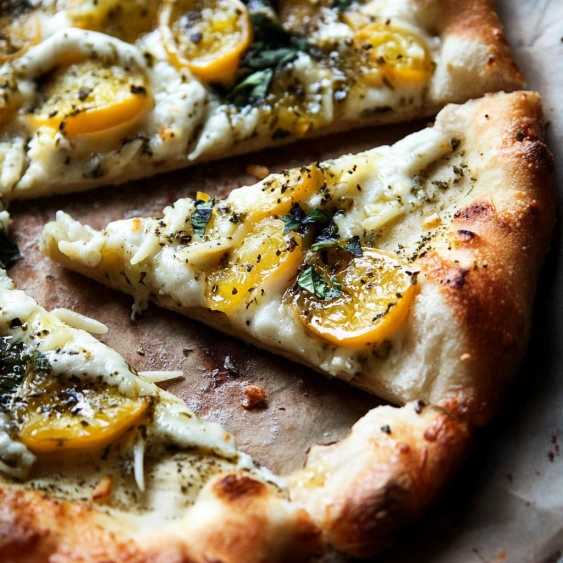 Pin it
Pin it
This Middle Eastern-inspired pizza combines the tangy spice of za'atar with the bright acidity of preserved lemons, all mellowed by creamy dollops of fresh ricotta. The combination creates an unforgettable flatbread that's both exotic and comforting at once.
I first made this pizza when I was craving something different from the usual tomato-and-cheese combinations. Now it's become my go-to impressive appetizer for dinner parties, always generating questions about the mysterious herbal topping.
Ingredients
- Pizza dough: Your favorite homemade or store-bought dough works perfectly here. A thinner crust allows the toppings to shine.
- Extra virgin olive oil: Use a good quality oil as it forms the base flavor of this pizza. The fruitier the better to complement the za'atar.
- Za'atar: This Middle Eastern spice blend provides the signature herbal, tangy flavor. Look for versions with vibrant green thyme and purple sumac for the best flavor.
- Preserved lemons: These intensely flavored lemons add bright pops of citrus. The rinds provide the most concentrated flavor, so chop them finely.
- Fresh ricotta: Opt for whole milk ricotta for the creamiest texture. Artisanal versions have a cleaner flavor than mass-produced varieties.
- Fresh basil leaves: Optional but adds a fresh aromatic note that bridges the Mediterranean and Middle Eastern flavors.
Step-by-Step Instructions
- Prepare Your Oven:
- Preheat your oven to 550°F with a Baking Steel or pizza stone inside. Allow a full 45 minutes for proper heating. The intense heat creates that perfect crispy crust with soft interior. Without a stone, simply preheat your oven and prepare a baking sheet with parchment.
- Rest Your Dough:
- Remove your pizza dough from the refrigerator about 20 minutes before baking. This relaxes the gluten and makes the dough more pliable for stretching. Cold dough fights back and can tear more easily.
- Shape and Top:
- Place parchment on a pizza peel or sprinkle the peel with cornmeal. Stretch your dough into a circle using lightly oiled hands. The oil prevents sticking and adds flavor. Create small dimples across the surface with your fingertips to catch the olive oil and spices. Sprinkle liberally with za'atar, scatter preserved lemon pieces, and drop spoonfuls of ricotta evenly across the surface. Finish with a light drizzle of olive oil to help everything brown nicely.
- Bake to Perfection:
- Slide the parchment with pizza onto your preheated steel or stone. The parchment prevents sticking and makes transfer easy. Bake for approximately 5 minutes if using a steel or stone. The crust should be spotted with char marks and puffed at the edges. On a regular sheet pan, expect 7 to 10 minutes cooking time. Watch closely as high temperatures can quickly take your pizza from perfect to overdone.
- Finish and Serve:
- Transfer your finished pizza to a cutting board and sprinkle with fresh basil leaves. Cut into wedges or squares and serve immediately while the contrast between the crisp crust and warm toppings is at its peak.
 Pin it
Pin it
This pizza reminds me of a trip to Jerusalem where I first discovered za'atar on fresh flatbread drizzled with olive oil. The fragrance of wild thyme and sumac transported me to sun-drenched hillsides, and I've been trying to recreate that sensory experience ever since. This pizza comes remarkably close.
Demystifying Za'atar
Za'atar is the magical ingredient that makes this pizza special. This Middle Eastern spice blend typically contains dried thyme, sumac, sesame seeds, and salt, though regional variations exist. The thyme provides herbaceous notes, sumac adds a lemony tang, and sesame seeds contribute nuttiness and texture. When shopping for za'atar, look for blends that appear fresh and vibrant in color. You can find it at Middle Eastern markets, specialty food stores, or even make your own by blending these key ingredients. The flavor becomes even more pronounced when mixed with good olive oil, making it perfect for this pizza application.
Storage and Make-Ahead Tips
This pizza is best enjoyed fresh from the oven, but you can prepare components in advance. The dough can be made up to 3 days ahead and stored in the refrigerator. Preserved lemons keep for months in your refrigerator, making them a wonderful pantry staple. If you have leftover pizza, store it in the refrigerator for up to 2 days. Reheat in a hot oven rather than the microwave to restore some crispness to the crust. For the best texture, place the cold pizza directly on a preheated baking sheet at 375°F for about 5 minutes.
Variations Worth Trying
While this combination is perfect as written, several variations work beautifully with the za'atar base. Try adding thin slices of roasted eggplant for a heartier version reminiscent of Middle Eastern mezze platters. For a protein addition, crumbled lamb sausage seasoned with cumin and coriander complements the za'atar wonderfully. If fresh ricotta is unavailable, labneh or even feta cheese can substitute, though each brings a different texture and tang level. For a vegan version, omit the cheese entirely and drizzle with tahini sauce after baking for a creamy element.
 Pin it
Pin it
Serving Suggestions
This flatbread works beautifully as part of a larger Mediterranean or Middle Eastern spread. Serve alongside a simple cucumber and tomato salad dressed with lemon and mint. A bowl of warm olives makes a perfect accompaniment. For beverages, try a crisp white wine like Vermentino or Albariño that can stand up to the bold flavors without overwhelming them. This pizza also works wonderfully cut into small squares as an appetizer for a dinner party, where its unique flavor profile will definitely become a conversation starter.
Frequently Asked Questions
- → What is za'atar and where can I find it?
Za'atar is a Middle Eastern spice blend typically containing roasted thyme, ground sumac, sesame seeds, and salt. You can find za'atar at specialty food stores, Middle Eastern markets, well-stocked grocery stores, or online. You can also make your own by combining dried thyme, sumac, toasted sesame seeds, and a pinch of salt.
- → Can I substitute something for preserved lemons?
If you don't have preserved lemons, you can substitute with a combination of fresh lemon zest and a small amount of finely chopped lemon flesh. Add a pinch of salt to mimic the briny quality. Alternatively, a small amount of finely chopped capers mixed with lemon zest can provide a similar tangy, salty flavor profile.
- → What type of ricotta works best for this pizza?
Fresh, high-quality whole milk ricotta works best for this pizza. Look for ricotta that's creamy and soft rather than grainy. If available, hand-dipped or artisanal ricotta will provide the best flavor and texture. Drain excess liquid from the ricotta before using to prevent the pizza from becoming soggy.
- → Do I need a pizza stone or Baking Steel to make this?
While a pizza stone or Baking Steel creates the best crust with optimal crispness, you can absolutely make this pizza on a regular baking sheet lined with parchment paper. The cooking time may be slightly longer (7-10 minutes versus 5 minutes), but the results will still be delicious.
- → Can I prepare the dough in advance?
Yes! Pizza dough can be prepared up to 3 days in advance and stored in the refrigerator. This actually improves flavor development. Just remove the dough from the refrigerator about 20 minutes before stretching to allow it to come to room temperature, making it easier to work with.
- → What side dishes pair well with this za'atar pizza?
This pizza pairs beautifully with Mediterranean-inspired sides like a simple green salad with lemon vinaigrette, tabbouleh, roasted vegetables with tahini sauce, or a classic Greek salad. A cooling cucumber-yogurt dip (tzatziki) also makes a nice accompaniment to balance the aromatic za'atar spices.
